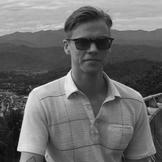Callan Schultz

PhD Candidate
Australian National University
Callan Schultz is a PhD candidate at the Australian National University, Canberra. His research examines the formation of Christian identities in northern Borneo, analysing the intersections of race, religion, and politics in the context of an Islamising and Islamised state. He was an Endeavour Scholar in 2016, completing 18-months ethnographic fieldwork in Sabah, Malaysia.
Agents of Faith: Christianity and Culture in Malaysia
Anthropologists have theorised postcolonial Christian expansion in terms of ‘cultural change,’ studying the processes of localisation that transform collective models of morality to incorporate a soteriological interpretation of individual personhood (Robbins 2004, Keane 2007). Callan Schultz' research draws on 18-months ethnographic fieldwork with a Christian Dusun community in Ranau, Sabah, to analyse the impact of Christianity in Malaysia. Following Liana Chua’s (2015) theory of horizontal and vertical relations, which redirects recent debates of in/dividualism by interrogating the intersections of “horizontal and vertical relations in which persons are enmeshed,” he examines the social productivity and political efficacy of evangelical faith networks in an increasingly Malay-Muslim dominated state. Here the local experience of a global religion is articulated as a collective project that assembles people as part of an active network of believers who perceive themselves as religious outliers antagonised by the pro-Islamic policies of the Malaysian government. Between 2015-2017, he lived with a local family in kampung, employing participant observation techniques to access daily routines and attend community events, including church, oil palm and rice farming, hunting, youth and Christian cell groups, family gatherings, religious holidays, etc. Callan Schultz' analysis seeks to locate an endogenous moral structure by exploring the ways his interlocutors expressed themselves as ‘good’ Christians. This was primarily revealed through the church, which was explained to him as a community of people, rather than a building. Being ‘good’ therefore requires active engagement with the church and those who are passive are perceived to be morally lacking. The concept of ‘internal responsibility’ is also discussed, making reference to the imbrication of inside/outside, private/public, local/national binaries that shape social practice. He investigates how his interlocutors gained a community-based approach to self-determination through their participation in faith networks, which bound people through collective optimism. Faith, he suggests, forms a central mode of the Christian Dusun imaginary, providing the conditions for persons to actively narrate themselves beyond the control of the state.
